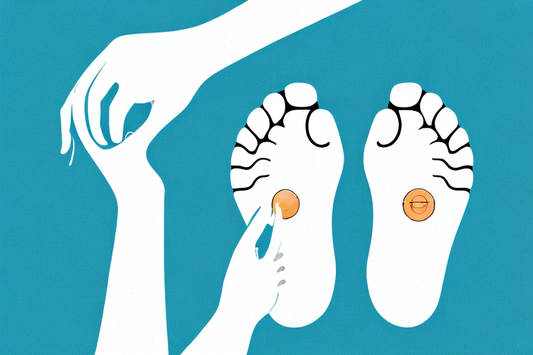
How to Heal or Prevent Diabetic Neuropathy Naturally For Good
If you're living with diabetes, you're already aware of the risks associated with this condition. While many people focus on blood sugar control, there's another, often-overlooked side effect of diabetes that can be just as dangerous: diabetic neuropathy. In this article, we'll go over what diabetic neuropathy is and its various types, symptoms and complications, as well as how to prevent the condition and reduce its impact using natural remedies.
Understanding Diabetic Neuropathy
What is Diabetic Neuropathy?
Diabetic neuropathy is a nerve disorder that affects people with diabetes. Elevated blood sugar levels over time can damage the nerves and blood vessels that supply them, impacting the way they function and communicate with the brain. Many people with diabetes experience neuropathy to some degree, but the severity of symptoms can vary widely.
It is important to note that diabetic neuropathy can occur in both type 1 and type 2 diabetes, and can develop at any stage of the disease. However, the longer a person has diabetes, the higher their risk of developing neuropathy.
Types of Diabetic Neuropathy
There are four main types of diabetic neuropathy, which can present with different symptoms:
- Peripheral neuropathy: Affecting the feet, legs, hands, and arms, this is the most common type of diabetic neuropathy. Symptoms include numbness, tingling, pain, and weakness in the affected areas.
- Autonomic neuropathy: This type of neuropathy affects the organs and body systems that are regulated by the autonomic nervous system, such as the digestive tract and the cardiovascular system. Symptoms can include bloating, constipation, dizziness, and fainting.
- Proximal neuropathy: Affecting the hips, thighs, and buttocks, this type of neuropathy is less common. Symptoms include pain, weakness, and loss of function in the affected areas.
- Focal neuropathy: This type of neuropathy can affect any specific nerve in the body, causing pain, weakness, and tingling sensations in the affected area.
It is important to note that some people may experience more than one type of diabetic neuropathy at the same time.
Symptoms and Complications
The symptoms of diabetic neuropathy can vary widely depending on the type of neuropathy and the severity of the condition. In some cases, neuropathy can go unnoticed for a long time, making it difficult to manage. Some of the most common symptoms of neuropathy include:
- Numbness and tingling sensations in the feet, legs, hands, and arms
- Pain and cramping in the affected areas
- Muscle weakness and loss of coordination
- Dizziness, fainting, and nausea
It is important to note that some people may not experience any symptoms of diabetic neuropathy, which is why regular check-ups with a healthcare professional are important for people with diabetes.
When left untreated, diabetic neuropathy can lead to other complications, such as:
- Foot ulcers and infections
- Bone and joint problems
- Gastroparesis (a condition that affects the digestive system)
- Heart and blood vessel problems
It is important for people with diabetes to manage their blood sugar levels and work with their healthcare team to prevent and manage diabetic neuropathy and its complications. This may involve lifestyle changes, such as regular exercise and a healthy diet, as well as medication and other treatments as prescribed by a healthcare professional.
Additionally, people with diabetes should regularly check their feet for any signs of injury or infection, and seek medical attention if they notice any changes or symptoms.
The Importance of Blood Sugar Control
Blood sugar control is essential for maintaining good health and preventing a range of complications, including diabetic neuropathy. Diabetic neuropathy is a type of nerve damage that can occur as a result of high blood sugar levels over an extended period.
How High Blood Sugar Affects Nerves
High blood sugar levels can damage the nerves by causing inflammation and reducing blood flow to the nerve cells. This damage can lead to problems with sensation and function, as well as a decrease in the body's ability to heal damaged nerves.
Diabetic neuropathy can affect any part of the body, but it most commonly affects the feet and legs. Symptoms can include numbness, tingling, burning, and pain. In severe cases, it can lead to amputation.
Monitoring and Managing Blood Sugar Levels
One of the most important steps in preventing and managing diabetic neuropathy is to maintain healthy blood sugar levels. This can be achieved through diet and exercise and may require medication for some people. Regular monitoring of blood sugar levels is also important to catch and correct any fluctuations in blood sugar early on.
It is recommended that people with diabetes check their blood sugar levels several times a day, especially before and after meals. This can help them to identify patterns and make adjustments to their diet and medication as needed.
The Role of Diet and Exercise
Eating a healthy diet and getting regular exercise can also help to manage blood sugar levels and prevent diabetic neuropathy. Foods that are high in fiber and low in saturated fats can help to control blood sugar levels, while regular exercise can improve insulin sensitivity and glucose uptake.
It is recommended that people with diabetes aim for at least 150 minutes of moderate-intensity exercise per week. This can include activities such as brisk walking, cycling, or swimming.
In addition to managing blood sugar levels, a healthy diet and regular exercise can also have other health benefits, such as reducing the risk of heart disease and stroke.
The Importance of Regular Check-Ups
Regular check-ups with a healthcare provider are also important for people with diabetes. These check-ups can help to monitor blood sugar levels, detect any complications early on, and make adjustments to treatment plans as needed.
It is recommended that people with diabetes have a comprehensive foot exam at least once a year to check for any signs of nerve damage or other foot problems. They should also have regular eye exams to check for diabetic retinopathy, a type of eye disease that can occur as a result of diabetes.
Conclusion
Managing blood sugar levels is crucial for preventing and managing diabetic neuropathy. A combination of healthy eating, regular exercise, medication (if needed), and regular check-ups with a healthcare provider can help to keep blood sugar levels under control and reduce the risk of complications.
Natural Remedies for Diabetic Neuropathy
Diabetic neuropathy is a type of nerve damage that can occur in people with diabetes. It is caused by high blood sugar levels, which can damage the nerves throughout the body. Symptoms of diabetic neuropathy can include numbness, tingling, and pain in the hands and feet.
Vitamins and Supplements
Several vitamins and supplements have been found to be effective in managing diabetic neuropathy. These include:
- Vitamin B12: This vitamin is essential for nerve function and can help to reduce symptoms of neuropathy. It is found in foods such as meat, fish, and dairy products, but can also be taken as a supplement.
- Alpha-lipoic acid: This supplement has antioxidant properties and can help to reduce inflammation and oxidative damage in the nerve cells. It is found in foods such as spinach and broccoli, but can also be taken as a supplement.
- Ginkgo biloba: This herb has been found to improve blood flow to the nerve cells, helping to reduce symptoms of neuropathy. It can be taken as a supplement or brewed into a tea.
It is important to speak with a healthcare provider before taking any new supplements, as they may interact with other medications or have side effects.
Essential Oils and Topical Treatments
Topical treatments can also help to reduce the symptoms of diabetic neuropathy. Essential oils such as lavender and peppermint can provide pain relief and reduce inflammation, while topical creams containing capsaicin can block pain signals and reduce sensitivity in the affected areas.
In addition to topical treatments, lifestyle changes such as regular exercise and a healthy diet can also help to manage symptoms of diabetic neuropathy.
Herbal Remedies
Several herbal remedies have been found to be effective in reducing symptoms of diabetic neuropathy. These include:
- Evening primrose oil: This herb contains gamma-linolenic acid, which can help to reduce inflammation and improve nerve function. It can be taken as a supplement or applied topically.
- St John's Wort: This herb can help to reduce pain and inflammation, and may also improve mood and sleep. It can be taken as a supplement or brewed into a tea.
- Ashwagandha: This Ayurvedic herb has been found to improve nerve function and reduce symptoms of diabetic neuropathy. It can be taken as a supplement or brewed into a tea.
It is important to speak with a healthcare provider before taking any new herbal remedies, as they may interact with other medications or have side effects.
In conclusion, managing diabetic neuropathy can be challenging, but there are several natural remedies that can help to reduce symptoms and improve quality of life. By incorporating vitamins, supplements, topical treatments, and herbal remedies into a comprehensive treatment plan, individuals with diabetic neuropathy can find relief and improve their overall health and well-being.
Lifestyle Changes for Prevention and Healing
Diabetic neuropathy is a condition that affects the nerves in the body, and it is a common complication of diabetes. The condition can cause pain, numbness, and tingling sensations in the hands and feet, and it can even lead to serious complications such as infections and ulcers. While medication and other medical treatments can help to manage the symptoms of diabetic neuropathy, there are also many natural remedies and lifestyle changes that can help to reduce symptoms and improve nerve function.
Exercise and Physical Activity
Regular exercise and physical activity can benefit people with diabetes in many ways. Exercise can help to manage blood sugar levels, improve circulation, and reduce inflammation and oxidative damage. Aim for at least 30 minutes of moderate exercise per day. This can include activities such as walking, swimming, or cycling.
Additionally, strength training exercises can help to build muscle mass and improve balance, which can reduce the risk of falls and injuries. Talk to your doctor or a physical therapist to develop an exercise plan that is safe and effective for you.
Stress Management and Relaxation Techniques
Stress can exacerbate the symptoms of diabetic neuropathy and make it harder to manage. Practice stress-reduction techniques such as meditation, deep breathing, or yoga to help calm the mind and reduce stress. These techniques can also help to improve sleep quality, which is important for overall health and well-being.
Other relaxation techniques that may be helpful include massage therapy, acupuncture, and aromatherapy. These therapies can help to reduce muscle tension and promote relaxation, which can help to alleviate symptoms of diabetic neuropathy.
Proper Foot Care and Hygiene
People with diabetic neuropathy are at a higher risk of developing foot problems such as infections and ulcers. Pay close attention to foot hygiene and care, such as keeping feet clean and well-moisturized, wearing properly fitting shoes, and having regular foot exams.
It is also important to inspect your feet daily for any signs of injury or infection, such as cuts, blisters, or redness. If you notice any issues, contact your doctor right away. Taking good care of your feet can help to prevent complications and keep you healthy.
In conclusion, diabetic neuropathy is a condition that affects many people with diabetes. While managing blood sugar levels is crucial for preventing neuropathy, there are also many natural remedies and lifestyle changes that can help to reduce symptoms and improve nerve function. By taking a holistic approach to diabetes care, you can better manage the symptoms of diabetic neuropathy and prevent complications down the line.




